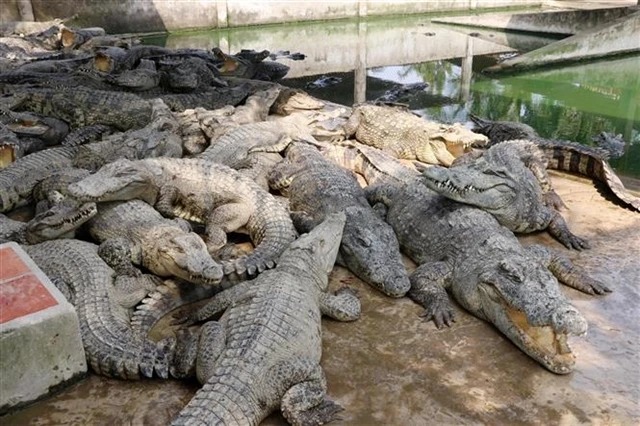Expanding export opportunities for crocodile industry
The Mekong Delta, particularly Dong Thap province, is recognised for its significant potential for crocodile farming. Recently signed protocols between Vietnam and China have opened substantial opportunities for the country's crocodile industry, fostering sustainable and stable development.

A crocodile farm in the Mekong Delta. (Photo: VNA)
The Mekong Delta, particularly Dong Thap province, is recognised for its significant potential for crocodile farming. Recently signed protocols between Vietnam and China have opened substantial opportunities for the country's crocodile industry, fostering sustainable and stable development.
According to the Ministry of Agriculture and Rural Development (MARD), China is the largest importer of live crocodiles from Vietnam. Currently, more than 99% of live crocodiles exported from Vietnam are sent to China, along with 29% of salted crocodile skins. Vietnam also exports crocodiles to markets such as Japan, Thailand, Singapore and several European Union countries.
However, since November 2019, China has halted imports of live crocodiles from Vietnam, creating challenges for crocodile farms in the southern region, where over 114,000 live crocodiles are ready for export. The negotiation and signing of protocols are seen as crucial to resuming live crocodile exports to China and creating growth opportunities for the industry.
In Dong Thap province, there are currently 36 crocodile farms with a total population of about 190,000 crocodiles. Of these, My Hiep Enterprise in Cao Lanh district farms over 177,000 crocodiles for export purposes. The remaining households primarily raise young crocodiles to sell to other farms for further commercial farming.
Yet Vietnam's crocodile industry faces several challenges, especially in expanding production and finding new markets. One major issue is the decline in crocodile skin prices, which has caused difficulties for many exporters. To ensure sustainable development, crocodile farms must strictly adhere to export regulations outlined in the protocols, as well as meet disease control and environmental protection requirements.
MARD has called on localities to direct relevant agencies and businesses to carefully study the protocols and develop responsible and sustainable plans. Local authorities also need to approve farming zone plans that comply with both Vietnamese and international laws, while also preventing disease and protecting the environment.
To promote exports, MARD has implemented various measures to support the development of the crocodile industry, including creating information management systems and data on product traceability and disease control. Businesses need to invest in upgrading infrastructure to meet export standards, including hygiene, disease control and environmental protection.
Pham Thien Nghia, Chairman of the Dong Thap People’s Committee, has requested MARD’s assistance in testing for diseases and building a product traceability system. These efforts will help protect the reputation of Vietnamese crocodile products and increase the value of businesses in the crocodile industry.
In the future, MARD agencies will continue to promote awareness and provide guidance to businesses on understanding protocol regulations. At the same time, they will collaborate with Chinese authorities to ensure a smooth export process./.
VNA
 Coordination programs are guaranteed to be practical and effective
Coordination programs are guaranteed to be practical and effective
 ENTERPRISES LISTED IN THE GREEN BOOK: Role models on sustainable environmental protection
ENTERPRISES LISTED IN THE GREEN BOOK: Role models on sustainable environmental protection
 Binh Duong-Yamaguchi (Japan): Ten-year connection
Binh Duong-Yamaguchi (Japan): Ten-year connection
 Binh Duong-Ymaguchi (Japan): Ten-year connection
Binh Duong-Ymaguchi (Japan): Ten-year connection
 Binh Duong - Yamaguchi (Japan): Ten-year connection
Binh Duong - Yamaguchi (Japan): Ten-year connection
 The driving force incurred by major constructions
The driving force incurred by major constructions
 Vietnam needs 14 billion USD to develop EV charging stations
Vietnam needs 14 billion USD to develop EV charging stations
 Bright prospects in exports
Bright prospects in exports
 Focus on infrastructure development increases investment attraction
Focus on infrastructure development increases investment attraction
 Today (December 11), the conference to announce the Construction Planning of Phu Giao District until 2040 took place
Today (December 11), the conference to announce the Construction Planning of Phu Giao District until 2040 took place











